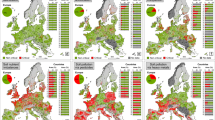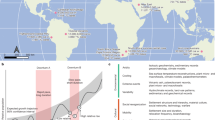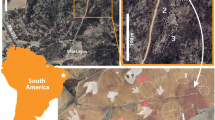Abstract
Recent movements towards decolonizing the university and promoting racial justice and equality in social relations have highlighted and challenged the colonial influences on contemporary science and scientific knowledge production. These colonial legacies have a direct bearing on power relations between the Global North and the Global South, as well as collaborations and partnerships with local scholars and local communities. Astrobiology is one scholarly discipline that often makes use of remote sites in the Global South. Here we examine the ethical implications of carrying out fieldwork that involves accessing and sampling these extreme environments. Experiences of local and international collaborations in these sites have highlighted the importance of co-learning when engaging with diverse communities of scientists and right holders living on and around field sites. We argue that adopting an ethical approach to research in these environments is relevant also to research on other celestial bodies and to the future of space exploration. We propose that understanding space and Earth as interconnected domains, mutually shaped by scientific theories and practices, calls for a new terminology: ‘planetary ethics’, which places attention on this interconnection.
This is a preview of subscription content, access via your institution
Access options
Access Nature and 54 other Nature Portfolio journals
Get Nature+, our best-value online-access subscription
$29.99 / 30 days
cancel any time
Subscribe to this journal
Receive 12 digital issues and online access to articles
$119.00 per year
only $9.92 per issue
Buy this article
- Purchase on Springer Link
- Instant access to full article PDF
Prices may be subject to local taxes which are calculated during checkout

Similar content being viewed by others
References
Martins, Z. et al. Earth as a tool for astrobiology—a European perspective. Space Sci. Rev. 209, 43–81 (2017). 2017.
Preston, L. J. & Dartnell, L. R. Planetary habitability: lessons learned from terrestrial analogues. Int. J. Astrobiol. 13, 81–98 (2014).
Marlow, J. J., Martins, Z. & Sephton, M. A. Organic host analogues and the search for Life on Mars. Int. J. Astrobiol. 10, 31–44 (2011).
Bhambra, G. K., Gebrial, D. & Nişancıoğlu, K. (eds) Decolonising the University (Pluto Press, 2018).
Nobles, M., Womack, C., Wonkam, A. & Wathuti, E. Ending racism is key to better science: a message from Nature’s guest editors. Nature 610, 419–420 (2022).
Evans, T. Helicopter science. Lateral 27 Society and Education https://web.archive.org/web/20220712042839/www.lateralmag.com/articles/issue-27-helicopter-science (2018).
Harding, S. G. Sciences from Below: Feminisms, Postcolonialities, and Modernities (Duke Univ. Press, 2008)
Smith, L. T. Decolonizing Methodologies: Research and Indigenous Peoples 2nd edn (Zed Books, 2012).
Adame, F. Meaningful collaborations can end ‘helicopter research’. Nature https://doi.org/10.1038/d41586-021-01795-1 (2021).
Burrough, S. Why I’m righting the wrongs of my early research and sharing my scientific data with local communities. The Conversation 191713 (14 December 2022); https://theconversation.com/why-im-righting-the-wrongs-of-my-early-research-and-sharing-my-scientific-data-with-local-communities-191713
Conducting scientific research in México. US Embassy and Consulates in Mexico https://mx.usembassy.gov/conducting-scientific-research-in-mexico/ (2021).
Schroeder, D., Chatfield, K., Singh, M., Chennells, R. & Herissone-Kelly, P. in Equitable Research Partnerships Springer Briefs in Research and Innovation Governance Ch. 7, 73–87 (Springer, 2019).
Kempf, H. et al. History of Native American land and natural resource policy in the United States: impacts on the field of paleontology. Paleobiology 49, 191–203 (2023).
Monarrez, P. et al. Our past creates our present: a brief overview of racism and colonialism in Western paleontology. Paleobiology 48, 173–185 (2022).
Picot, L. E. & Grasham, C. F. Code of Conduct for Ethical Fieldwork (Univ. Oxford 2022).
Tavares, F. et al. Ethical exploration and the role of planetary protection in disrupting colonial practices. Bull Am. Astron. Soc. https://doi.org/10.3847/25c2cfeb.cdc2f798 (2020).
Nagoya Protocol on Access to Genetic Resources and the Fair and Equitable Sharing of Benefits Arising from Their Utilization to the Convention on Biological Diversity (United Nations Secretariat of the Convention on Biological Diversity, 2011); https://www.cbd.int/abs/doc/protocol/nagoya-protocol-en.pdf
Ramírez-Castañeda, V. et al. A set of principles and practical suggestions for equitable fieldwork in biology. Proc. Natl Acad. Sci. USA 119, e2122667119 (2022).
Peppoloni, S., Bilham, N. & Di Capua. G. in Exploring Geoethics: Ethical Implications, Societal Contexts, and Professional Obligations of the Geosciences (ed. Bohle, M.) 25–70 (Springer, 2019).
Navajos upset after ashes sent to the Moon. The Spokesman Review https://www.spokesman.com/stories/1998/jan/15/navajos-upset-after-ashes-sent-to-moon-nasa/#:~:text=In%20a%20tribute%20to%20Shoemaker,and%20upset%2C%E2%80%9D%20he%20said (2018).
Smiles, D. The settler logics of (outer) space. Society and Space https://www.societyandspace.org/articles/the-settler-logics-of-outer-space (2020).
Valentine, D., Olson, V. & Battaglia, D. Extreme: limits and horizons in the once and future cosmos. Anthropol. Q. 85, 1007–1026 (2012).
Davis, D. K. The Arid Lands: History, Power, Knowledge History for a Sustainable Future (MIT Press, 2016).
Detwiler, K. M. Logistical natures in Andean worlds. Logistical Worlds (2021).
Salazar, J. F. Microbial geographies at the extremes of life. Environ. Humanit. 9, 398–417 (2017).
Rothschild, L. J. & Mancinelli, R. L. Life in extreme environments. Nature 409, 1092–1101 (2021).
Marino, A. in The Routledge Handbook of Social Studies of Outer Space (eds Salazar, J. F. & Gorman, A.) 281–294 (Routledge, 2023).
Latour, B. We Have Never Been Modern (Harvard Univ. Press, 1993).
CLEAR Lab Book: A Living Manual of Our Values, Guidelines, and Protocols V.03 (Civic Laboratory for Environmental Action Research, Memorial University of Newfoundland and Labrador, 2021).
Liboiron, M., Simmonds, E., Allen, E. & Wells, E. In Making & Doing: Activating STS through Knowledge Expression and Travel (eds Downey, G. L. & Zuiderent-Jerak, T.) 137–153 (MIT Press, 2021).
Vereb, V., van Wyk de Vries, B., Hagos, M. & Karátson, D. Geoheritage and resilience of Dallol and the Northern Danakil Depression in Ethiopia. Geoheritage 12, 82 (2020).
Moseki, M. Botswana: Ministry suspends film, research permits. All Africa https://allafrica.com/stories/201708170662.html (2017).
Armando, A.-B. et al. Dark microbiome and extremely low organics in an Atacama fossil river delta unveil the limits for life detection on Mars. Nat. Commun. 14, 808 (2023).
Rao, N. Astronomers may not like it but astronomy and colonialism have a shared history. The Wire https://thewire.in/the-sciences/thirty-meter-telescope-native-hawaiians-mauna-kea-astronomy-colonialism (2020).
Ghani, M., Hurrell, R., Verceles, A. C., McCurdy, M. T. & Papali, A. Geographic, subject, and authorship trends among LMIC based scientific publications in high-impact global health and general medicine journals: a 30-month bibliometric analysis. J. Epidemiol. Glob. Health 11, 92–97 (2021).
Morton, B. et al. Consensus statement on measures to promote equitable authorship in the publication of research from international partnerships. Anaesthesia 77, 264–276 (2021).
Franchi, F. et al. Late Pleistocene–Holocene palaeoenvironmental evolution of the Makgadikgadi Basin, Central Kalahari, Botswana: new evidence from shallow sediments and ostracod fauna. Front. Ecol. Evol. 10, 818417 (2022).
Franchi, F., MacKay, R., Thato Selepeng, A. & Barbieri, R. Layered mound, inverted channels and polygonal fractures from the Makgadikgadi Pan (Botswana): possible analogues for Martian aqueous morphologies. Planet. Space Sci. 192, 105048 (2020).
Azua-Bustos, A., González-Silva, C. & Fairén, A. G. The Atacama Desert in Northern Chile as an analog model of Mars. Front. Astron. Space Sci. 8, 810426 (2022).
Babidge, S. Contested value and an ethics of resources: water, mining and indigenous people in the Atacama Desert, Chile. Aust. J. Anthropol. 27, 84–103 (2016).
Samakov, A. & Berkes, F. Spiritual commons: sacred sites as core of community-conserved areas in Kyrgyzstan. Int. J. Commons 11, 422–444 (2017).
Mors, R. A. et al. Assessing the origin of pisoids within a travertine system in the border of Puna Plateau, Argentina. Sedimentology 69, 1252–1275 (2022).
Fricker, M. Epistemic Injustice: Power and the Ethics of Knowing (Oxford Univ. Press, 2011).
Holliman, R. et al. A case study from Guyana of adapting engaged research design to promote fairness in knowing. Res. All https://doi.org/10.14324/RFA.06.1.12 (2022).
Shorter, D. D. & TallBear, K. An introduction to settler science and the ethics of contact. Am. Indian Cult. Res. J. 45, 1–8 (2021).
Atalay, S., Lempert, W., Shorter, D. D. & TallBear, K. Indigenous studies working group statement. Am. Indian Cult. Res. J. 45, 9–18 (2021).
Acknowledgements
We thank the research group AstrobiologyOU, funded by Research England’s grant ‘Expanding Excellence in England’ 124.18, for enabling and fostering conversations about ethics. A.M., S.B. and K.O.-F. are core members of AstrobiologyOU and have been funded by this grant. Some of the collaborations described were supported by Europlanet 2024 RI (this project has received funding from the European Union’s Horizon 2020 research and innovation programme under grant agreement no. 871149). F.J.G. funding: Project PIP11220200102042CO. A.A.-B. thanks the support of the Human Frontiers Science Program grant no. RGY0066/2018 and European Research Council Consolidator Grant no. 818602.
Author information
Authors and Affiliations
Contributions
This paper was conceived and completed collaboratively by the authors. The ideas were workshopped and refined through collective meetings and asynchronous conversations. All authors were equally part of this collective production and have reviewed the paper in several phases. Their knowledge and effort in providing testimonies of their experience and reflections have been acknowledged through collective authorship.
Corresponding author
Ethics declarations
Competing interests
The authors declare no competing interests.
Peer review
Peer review information
Nature Astronomy thanks Dana Burton, Melissa Kirven-Brooks and Monica Vidaurri for their contribution to the peer review of this work.
Additional information
Publisher’s note Springer Nature remains neutral with regard to jurisdictional claims in published maps and institutional affiliations.
Rights and permissions
Springer Nature or its licensor (e.g. a society or other partner) holds exclusive rights to this article under a publishing agreement with the author(s) or other rightsholder(s); author self-archiving of the accepted manuscript version of this article is solely governed by the terms of such publishing agreement and applicable law.
About this article
Cite this article
Marino, A., Franchi, F., Lebogang, L. et al. Ethical considerations for analogue fieldwork in extreme environments. Nat Astron 7, 1031–1036 (2023). https://doi.org/10.1038/s41550-023-02065-y
Received:
Accepted:
Published:
Issue Date:
DOI: https://doi.org/10.1038/s41550-023-02065-y



